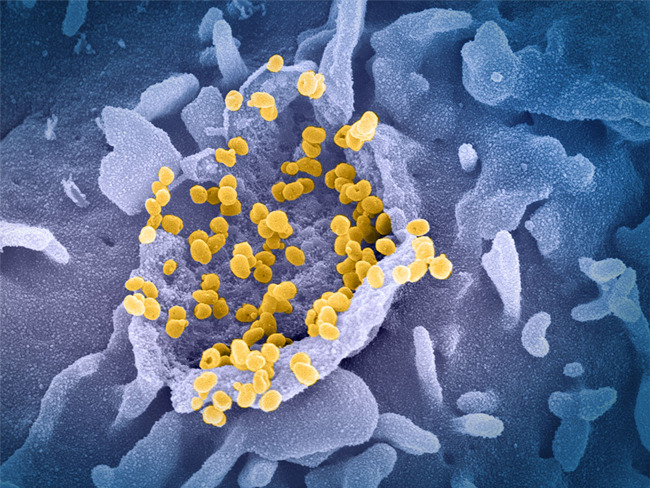Original: Nature (2021-10-19) | doi: 10.1038 / d41586-021-02825-8
COVID reinfections likely within one or two years, models proposed
Lynne Peeples
Without protective measures such as wearing masks and vaccination, the risk of reinfection reached 17% 50 months after initial infection, predicted by viral evolutionary relationships.

People infected with the new coronavirus (Severe Acute Respiratory Syndrome Coronavirus 2; SARS-CoV-2) are at risk of reinfection within 1-2 years if protective measures such as wearing masks and vaccination are not taken. Expected to be exposed. Estimated by a model based on the evolutionary relationship between SARS-CoV-2 and other coronaviruses1.
It has also been warned that if not vaccinated, it could even be re-infected just months after the initial infection.Jeffrey Townsend, a bioinformatics researcher at Yale School of Public Health (New Haven, Connecticut, USA), one of the authors of the paper, said, "Immunity doesn't last very long. Should be. "
Data needs to be collected over the next few months or years to accurately determine the duration of the acquired immunity. "But I don't want to wait until then, and I don't have to," says Townsend.
To estimate the duration of immunity to SARS-CoV-2, Townsend et al. Wanted to know how the levels of antibodies produced by past infections affect the risk of reinfection.Previous research on the coronavirus that causes the common cold2Since it was an "endemic" virus that exists on a daily basis, we were able to graph this effect over several years.However, since SARS-CoV-2 has just emerged, such long-term data are not available.
To fill this gap, Townsend et al. Worked on three endemic coronaviruses and SARS-CoV-3, a closely related severe acute respiratory syndrome coronavirus (SARS-CoV), and the Middle East respiratory syndrome corona. A phylogenetic tree of coronavirus was created using the genomic data of the virus (MERS-CoV).Then, based on the phylogenetic tree, we modeled how the traits of the virus evolved over time.This modeling allowed us to estimate the rate of decay of antibody levels after SARS-CoV-2 infection and other factors needed to understand the risk of reinfection.
The results showed that the average risk of reinfection was about 4% 5 months after the initial infection, but increased to 17% 50 months later.In conclusion, immunity to SARS-CoV-2 is less than half the duration of immunity to the three cold-causing coronaviruses.
Townsend is "surprised and afraid" of the findings, suggesting that the new coronavirus infection (COVID-19) may move from a pandemic to an endemic. Say I felt it.
Unconfirmed problem
However, there are many unclear points such as the severity of reinfection.There are also large individual differences in the ease of reinfection and the course of the disease (whether it is prolonged or not) in the event of reinfection.
Sarah Cobey, an evolutionary biologist at the University of Chicago, Illinois, USA, assumes that the study "can predict the similarity of traits associated with reinfection based on the genetic similarity of the virus." It draws attention to the fact that it is based on. She points out that it may be too early to confidently state how quickly immunity diminishes after being infected with SARS-CoV-2.But from a scientific point of view, she adds, it is certain that immunity is diminished. "Everyone thinks that the effects of immunity will not last that long against viruses that are evolving to escape immunity."
Cobey also emphasizes that even people who have been infected need to be vaccinated to boost their immunity.In this regard, research results published by the Centers for Disease Control and Prevention (CDC) in August 20213You can understand even if you look at it. The CDC study is looking at those who were infected with SARS-CoV-2020 in 2 and who were re-infected in May or June 2021.The results showed that those who were not vaccinated were more than twice as likely to be re-infected as those who were vaccinated.
(Translation: Yoichi Fujiyama)
References
- Townsend, JP et al. Lancet Microbe https://doi.org/10.1016/S2666-5247(21)00219-6 (2021)
- Edridge, AWD et al. Nature Med. 26, 1691-1693 (2020).
- Cavanaugh, AM, Spicer, KB, Thoroughman, D., Glick, C. & Winter, K. Morb. Mortal. Wkly Rep. 70, 1081-1083 (2021).
* This article is reprinted from "Nature Digest".
Reprinted from: Nature Digest 2021 No. 12
"Predicted result that immunity obtained by SARS-CoV-2 infection "lasts only 1 to 2 years"'
Nature Digest Vol. 18 No. 12 | doi: 10.1038 / ndigest.2021.211212
